-
Python Extension Programming with C
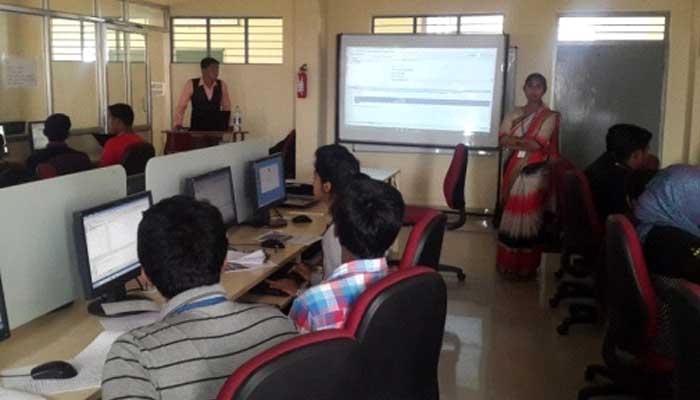 Python Extension Programming with C was conducted on 22nd Oct 2016. This event addresses to students how to code in phython language. They will write C, C++, or Java code that is integrated or imported into another Python script. This imported code is considered as an "extension.”. Students will gain the knowledge of python coding and compiling. Resource Persons of the event are Mr. Veerendra Patil H V, Asst Professor, Dept. of CSE, DBIT and Mr. Mansoor Khan M, Student, 7th Sem, Dept. of CSE, DBIT.
Python Extension Programming with C was conducted on 22nd Oct 2016. This event addresses to students how to code in phython language. They will write C, C++, or Java code that is integrated or imported into another Python script. This imported code is considered as an "extension.”. Students will gain the knowledge of python coding and compiling. Resource Persons of the event are Mr. Veerendra Patil H V, Asst Professor, Dept. of CSE, DBIT and Mr. Mansoor Khan M, Student, 7th Sem, Dept. of CSE, DBIT. -
Basic in C Programming
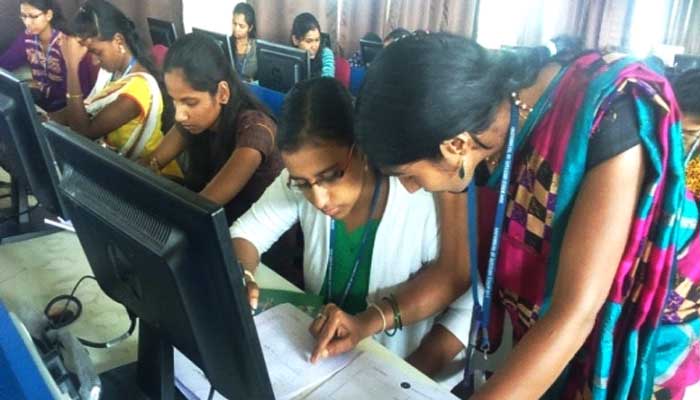 Department of computer science and engineering has conducted workshop on “Basic in C Programming“ from 11th to 18th Aug 2016. This event is organized by Veerendra Patil H V and Parvathi C , Asst Professors, Dept. of CSE , DBIT. This workshop concentrate on working principles of branch oriented(IS and CS) subjects , such as programming languages, computer architectures, operating systems, network communication, database, graphical user interface (GUI), graphics, image processing, parallel processing, multi-threads, real-time systems, device drivers, data acquisition, algorithms, numerical analysis, and computer game, which are based on features of C.
Department of computer science and engineering has conducted workshop on “Basic in C Programming“ from 11th to 18th Aug 2016. This event is organized by Veerendra Patil H V and Parvathi C , Asst Professors, Dept. of CSE , DBIT. This workshop concentrate on working principles of branch oriented(IS and CS) subjects , such as programming languages, computer architectures, operating systems, network communication, database, graphical user interface (GUI), graphics, image processing, parallel processing, multi-threads, real-time systems, device drivers, data acquisition, algorithms, numerical analysis, and computer game, which are based on features of C. -
Five Days FDP on "Web Technologies"
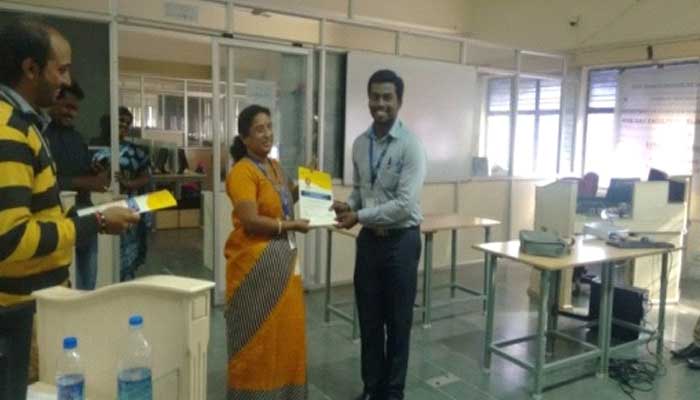 Department has organized Five Days FDP on “Web Technologies”. This event has conducted by Spaneous Software Solution, Bangalore, held from 8th to 12th June 2015.
Department has organized Five Days FDP on “Web Technologies”. This event has conducted by Spaneous Software Solution, Bangalore, held from 8th to 12th June 2015. -
Ten Days Immersion Program on "Web Technologies"
Ten Days Immersion Program on "Web Technologies" 30th June 2015 to 10th July 2015. Conducted by Department of CSE. This workshop covers introduction to web design with the focus to familiarize students with the latest trends in Web development as well give some introduction to the basic technologies and the most common terminologies used in the web development. In addition the students will be presented with common web development frameworks that will allow them to speed up the development of their own open source web platform based website without requiring them to learn programming. -
Microprocessor Programming
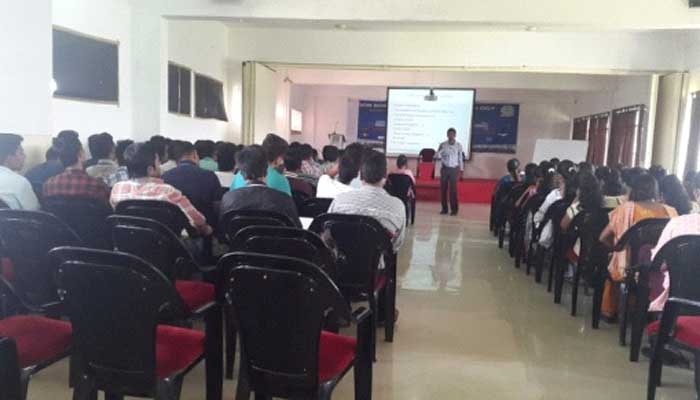 Department has conducted one day workshop on “Microprocessor Programming” on 7th May 2015 for various department faculties. Resource person for this event is Prof. Anand Reddy, Dept. of CSE, RLJIT, Bangalore.
Department has conducted one day workshop on “Microprocessor Programming” on 7th May 2015 for various department faculties. Resource person for this event is Prof. Anand Reddy, Dept. of CSE, RLJIT, Bangalore. -
Distributed Computing-14SCN22 and 14SCN26 Hands-On Sessions in Laboratory Experiments
Three Days Workshop On “Distributed Computing-14SCN22 and 14SCN26 Hands-On Sessions in Laboratory Experiments” in Collaboration with ”SPANEOS” held from 29th to 31st Jan, 2015 addressed by Mr.Pradeep Kumar. M, Chief Technology Officer, Spaneos. VTU sponsored three days workshop on "Distributed Computing- 14SCN22 and 14SCN26, Hands-on Sessions in Laboratory Experiments" from 29th - 31st January, 2015, organized by Department of CSE. Distributed Computing is a field of computer science that studies distributed systems. A distributed system is a model in which components located on networked computers communicate and coordinate their actions by passing messages. The components interact with each other in order to achieve a common goal. -
Research Trends in Image Processing and Hands on Using MATLAB
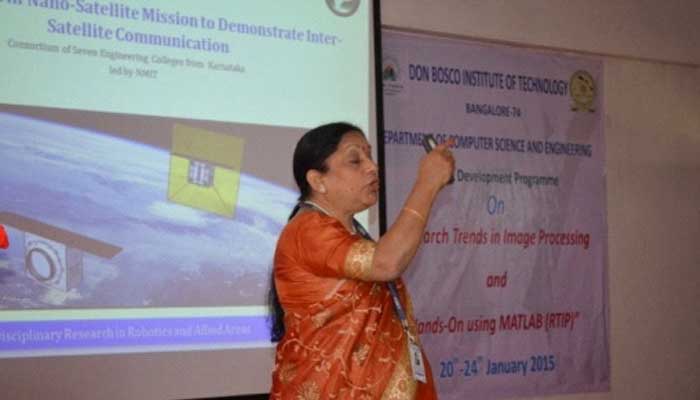 University Sponsored Programs FDP on “Research Trends in Image Processing and Hands on Using MATLAB” conducted from 20th to 24th Jan 2015 for faculties. The resource person for this FDP is Dr. Jharna Majumdar, (Former Sci. G &, AIE Div., DRDO) Prof.& Head, CSE (PG), Dean R&D, NMIT, Bangalore.
University Sponsored Programs FDP on “Research Trends in Image Processing and Hands on Using MATLAB” conducted from 20th to 24th Jan 2015 for faculties. The resource person for this FDP is Dr. Jharna Majumdar, (Former Sci. G &, AIE Div., DRDO) Prof.& Head, CSE (PG), Dean R&D, NMIT, Bangalore. -
Wi-Fi Uploading
Department has conducted Technical Seminar on “Wi-Fi Uploading” April 2nd, 2014. Resource person for this seminar is Mr. Samba Murthy C V. This workshop will cover the basic knowledge needed to configure and deploy a WiFi to upload video files to your iOS device using a Web browser from a computer on the same Wi-Fi network. It makes adding content to your iPhone or iPad in a convenient and simple manner. -
Facebook for Student Developer
Technical Seminar on “Facebook for Student Developer” conducted on Feb 25th 2014. Mr. Sandeep Hegde addressed this seminar. The motto of this seminar is to provide mobile development experience to students who are historically under-represented in computer science. -
Microsoft Research and Development
Technical Seminar on “Microsoft Research and Development” conducted on Feb 17th, 2014 addressed by Mr. Srinath, R&D Microsoft. Microsoft Research is a global research organization dedicated to expanding the possibilities of computing. It takes on a wide variety of activities, spanning mission-focused problem solving and technology development to “blue-sky,” curiosity-driven, basic research.. In this talk, Peter Lee will provide a glimpse into the breadth of research in the lab today and will describe the lab’s strategy for creating high impact for the company and the world. A key part of this approach involves embracing the diversity that is inherent in computing research, using a “quadrant” model that spans short-term to long-term research on one axis and reactive problems to open-ended exploration on the other. -
Information Security and Ethical hacking
Technical Seminar on “Information Security and Ethical hacking” conducted on Jan 31st,2014, addressed by a resource person Mr. Haja Moideen Traid Square Infosec Pvt Ltd. Penetration Testing with Kali Linux (PWK) is an online information security training and ethical hacking course. This online security training is designed for network administrators and security professionals who need to acquaint themselves with the world of offensive security. Our penetration testing training introduces the latest hacking tools and techniques in the field and simulates a full penetration test from start to finish. will gain hands-on experience by injecting yourself into a diverse and vulnerable network. -
Microsoft Ventures Hackday
Technical Seminar on “Microsoft Ventures Hackday” held on 28th Oct, 2013 addressed by Mr. Blake Merrian of Social Intelligence. Microsoft Ventures presents an exclusive hackday; a chance for top developers to dive into application development using the APIs of our portfolio companies. -
Advance Software Technology
Technical Seminar on “Advance Software Technology” held on 14th Aug,2013, addressed by Mr. Sathish T,T-SYS. Advance Software Tech Inc. is a minority enterprise and specialized leader in providing professional staffing and consulting services to our client all across the globe. Advance Software Tech is a leading systems engineering and integration company in USA and India, offering application design, development, testing services and asset-based solutions in niche segments through turnkey projects for mission critical systems. Advance Software Tech has also been expanding its service presence in international markets offering offshoring advantages. -
Android Augmented Reality
Technical Seminar on “Android Augmented Reality” 9th April , 2013 addressed by Mr. ShanmugaSrinivas. Android source code is released by google under open source licenses, although most android devices ultimately ship with their combination of open source software initially developed by Android, Inc which google backed financially and later bought in 2005, Android was unveiled in 2007along with the founding of the open handset Alliance-a consortium of hardware, software and telecommunication companies devoted to advancing open standards for mobile devices. -
Faculty Development Program on Network Simulator (NS-2)
Five Days Faculty Development Program on Network Simulator (NS-2) Held on Jan 21-25, 2013 by Dr. R. Nataraj, NAL Dr. Giridhar, IITM Dr. M. Narasihmamurthy, IISc ,Mr.Subramanya, TetCos. Dr. K.R Rajagopal, IISc. This seminar is about Hands on training on NS-2 are to enrich the participants on the working of NS-2, (Open Source Network Simulator). This Five day FDP is intended to provide practical exposure to Faculty Members and Research Scholars. The Workshop aims at deliberation, sharing knowledge to the target audience about the significance of NS-2 and present current research opportunities in it. The discussion shall foster inter-disciplinary collaborative research in networking using NS-2. Also this workshop provides an excellent opportunity to exchange ideas on the topics of importance along with thought provoking technical sessions -
Educational Pathways at USA
Technical Seminar on Educational Pathways at USA held on 25th August 2012 addressed by Joanne(jody) R.Lehr Dr. Ratna Sinha This unique program of academic development and personalized university counselling, our students progress onto some of the best universities in the USA. -
Lead India
Social Seminar on Lead India held on 29th March 2012 by Mr. Kiran Sagar,Mr. Palyam Ramesh, Ms. Shwetha Rao
Yuva Global Foundation is one of India’s largest youth volunteering organizations. Thousands of volunteers from several cities across India contribute towards education, women empowerment, environment and other causes. -
Careers in Indian IT Industry
Technical Seminar on Careers in Indian IT Industry held on 09th March 2012, addressed by Dr. Anup Gangwar and Dr. Basant Dwivede(VIRTQ). Information technology is playing an important role in India today and has transformed India's image from a slow moving bureaucratic economy to a land of innovative. The IT sector in India is generating 2.5 million direct employments. India is now one of the biggest IT capitals of the modern world and all the major players in the world IT sector are present in the country. -
Android and its Applications
Technical Seminar on Android and its Applications held on 01st March 2012 addressed by Mr. Syed Nazimuddin, Wipro Technologies. This seminar is about Operating Systems have developed a lot in last 15 years. Starting from black and white phones to recent smart phones or mini computers, mobile OS has come far away. Especially for smart phones, Mobile OS has greatly evolved from Palm OS in 1996 to Windows pocket PC in 2000 then to Blackberry OS and Android. -
Masters in wireless health
Technical Seminar on Masters in wireless health held on 01st March 2012 addressed by Prof. Srinivas Raghavan,Case Western Reserve University, San Diago Programs USA This seminar is about Wireless health leverages wireless connectivity to enable diagnosis, monitoring and therapy anytime, anywhere, thus promising to improve care, enhance patients’ quality of life, reduce cost of health care and extend care to remote areas -
Formal Language & Automata Theory And Compiler Design
18. Five Days Faculty Development Program on Formal Language & Automata Theory And Compiler Design held on JAN 23 – 27, 2012. Resources person of this workshop are Dr. Kamala Keerthivasan ,Dept. of CSE, IITM, Dr. Ramadevi, Dept. of CSE, IITM, Dr. Ravi Kumar, Wipro Technologies, Prof. B.I Khodanpur, Dept. of CSE, RNSIT, Mrs. Kaveri, Prof. Dept. of CSE, RVCE
The five days’ workshop is intended to provide the basic concepts and hands on training on the formal language and finite automata theory Viz. –Deterministic pushdown automata (DPA), Linear bounded automaton(LBA), Turing machine, Nondeterministic/Deterministic Finite state machine(FSM), Nondeterministic automaton, and the Deterministic Büchi automaton. Understanding and use of these tools will facilitate the students and faculties of ISE, CSE, ECE and TCE branches in the design and implementation of BE / M.Tech students project work.
The Automata theory is the study of abstract machines and automata, as well as the computational problems that can be solved using them. It is a theory in theoretical computer science, under Discrete mathematics.Automata theory is also closely related to formal language theory. An automaton is a finite representation of a formal language that may be an infinite set. Finite-state machines can model a large number of problems, among which are electronic design automation, communication protocol design, language parsing and other engineering applications. In biology and artificial intelligence research, state machines or hierarchies of state machines have been used to describe neurological systems and in linguistics—to describe the grammars of natural languages.. Turing machine can be adapted to simulate the logic of any computer algorithm, and is particularly useful in explaining the functions of a CPU inside a computer -
Career Opportunities in the field on Digital Media
24. Technical Seminar on Career Opportunities in the field on Digital Media held on 24th Feb 2011 Resource Persons are Mr. David Dharamraj, Image Infotainment Limited Multimedia and digital communications programs train students to create and use technologies for computers, mobile devices and broadcasting. Students in this field may choose to focus their efforts in one or more specific areas, including web development, computer animation, or digital photography. Many careers in this field are very competitive, and experience through internships and a strong portfolio can be a big help in finding a job.
Depending on a student's area of interest, careers in multimedia and digital communication can vary widely. For those interested in film, a career as a film and video editor may be a good choice, as these positions involve work for television or film studios as well as advertising agencies to edit video clips into sequence.
DON BOSCO BANGALORE
DON BOSCO VIRTUAL TOUR
Address
Don Bosco Group of Institutions,Mysore Road, Kumbalagodu,Bangalore - 560074, Karnataka, India.
Phones
080 28437025
080 28437027
Email Addresses
